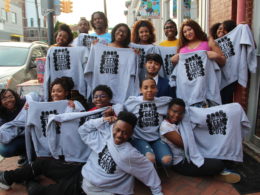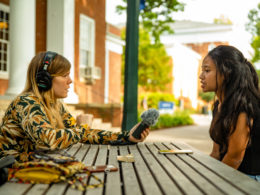For the last 10 years, Richmond-based Capital Trees has been creating perennial green space out of mostly neglected tracts of land by planting trees…and shrubs and flowers and ground cover. But beyond what the name suggests, Capital Trees is not just an organization that simply plants things. It is an urban greening organization, helping restore and resurrect urban spaces in a way that brings them new life.
Capital Trees’ projects include the Low Line Gardens, a $1.2 million horticultural restoration hugging the Kanawha Canal between the 17th Street floodwall and Great Shiplock Park. About four years ago, the organization unveiled the Low Line as a 5.5-acre linear garden replete with native trees, shrubs and a diverse plant palette, making it one of the most-visited stretches of the Virginia Capital Trail.
Last spring, Capital Trees planted an exclamation point at the end of the Low Line, a restoration project called the Low Line Green. The initiative included a remediation component, diverting and cleaning stormwater from overhead, the not-so-subtle presence of Interstate 95.
“We created a series of rain gardens that clean close to 150,000 gallons of stormwater a year,” explained Frazier Armstrong, the organization’s executive director. “It’s also worth noting that more than 80% of the plants in the Green are native to the region; that is our mantra because those plants thrive, they work harder.”
The pandemic forestalled a celebration of the Green’s completion last April, but no matter, Capital Trees is already focusing on what’s next, and that includes being an active participant in the Mayor’s Green Team, a working group charged with transforming green space within the City. The group has identified at least five city-owned tracts that are prime candidates for transformation, and Armstrong says that Capital Trees is in a good position to lend its expertise as the projects move along.
New growth
Meanwhile, Capital Trees just announced that it is overseeing a different kind of growth – its own. The organization has hired its first full-time staffer.

Lisa Trapp has been appointed as Capital Trees’ new program and outreach manager. A former supervisor at Rockwood Nature Center with Chesterfield County Parks and Recreation, Trapp will hit the ground (yes, pun intended) running, helping the nonprofit build community engagement, oversee its education and volunteer programs and grow collaborative partnerships with jurisdictions and other like-minded groups.
“I hope I can provide a level of stability that allows the organization to continue the work that they have been doing, but with even more community support and an organized volunteer task force to keep up with it all,” said Trapp.
Trapp, who graduated with a B.S. in Wildlife Science from Virginia Tech, has been more than an interested bystander to the work of Capital Trees over the years.
“I live in the city, and I remember what the area looked like before the Capital Trail went in, and before the Low Line Gardens,” recalled Trapp. “To walk through that space now is inspiring. The dedication Capital Trees has for developing green spaces alone made this [the position] an exciting opportunity, but it was their additional steps toward sustainable urban gardening, use of native species and installation of biofiltration systems that made it impossible to walk away from. They have accomplished so much in 10 years.”
The perfect canvas
Moving forward, Trapp sees the need for continuing projects of this nature, but she also wants to see the city look at the big picture when it comes to envisioning a greener local ecosystem.
“People have broken landscape development and restoration into separate boxes, and we need a new approach,” she said. “Instead of it just being about usable green space for people or increasing wildlife habitat or cleaner rivers, it should be about all those things and more, functioning together. Richmond’s history, proximity to the James River and need for accessible parks makes it a perfect canvas for approaching these projects holistically.
“Capital Trees is at the forefront of tackling this way of thinking in how they landscape the gardens, their installations and their long-term management. I really believe that Capital Trees is setting a higher bar in Richmond, while also serving the communities with the greatest need.”
If you’d like to learn more about Capital Trees, visit its website or follow it on Facebook and Instagram.










